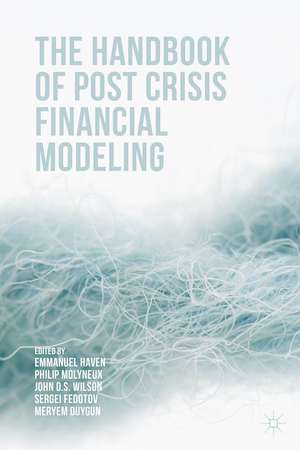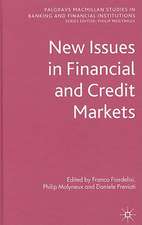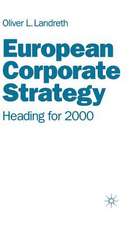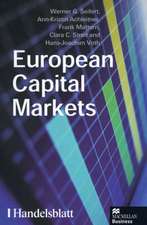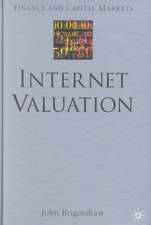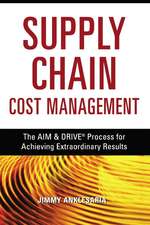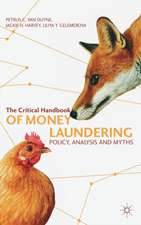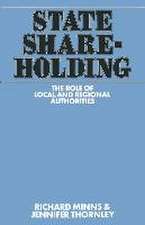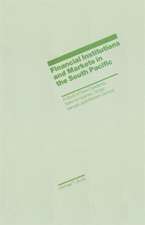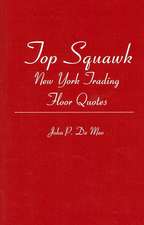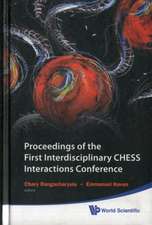The Handbook of Post Crisis Financial Modelling
Editat de Emmanuel Haven, Philip Molyneux, John Wilson, Sergei Fedotov, Meryem Duygunen Limba Engleză Hardback – 25 noi 2015
This unique Handbook brings together leading practitioners and academics in the areas of banking, mathematics, and law to present original research on the key issues affecting financial modelling since the 2008 financial crisis. As well as exploring themes of distributional assumptions and efficiency the Handbook also explores how financial modelling can possibly be re-interpreted in light of the 2008 crisis.
Preț: 402.17 lei
Nou
Puncte Express: 603
Preț estimativ în valută:
76.98€ • 83.65$ • 64.70£
76.98€ • 83.65$ • 64.70£
Carte tipărită la comandă
Livrare economică 22 aprilie-06 mai
Preluare comenzi: 021 569.72.76
Specificații
ISBN-13: 9781137494481
ISBN-10: 1137494484
Pagini: 368
Ilustrații: XIX, 316 p.
Dimensiuni: 155 x 235 x 35 mm
Greutate: 0.75 kg
Ediția:1st ed. 2015
Editura: Palgrave Macmillan UK
Colecția Palgrave Macmillan
Locul publicării:London, United Kingdom
ISBN-10: 1137494484
Pagini: 368
Ilustrații: XIX, 316 p.
Dimensiuni: 155 x 235 x 35 mm
Greutate: 0.75 kg
Ediția:1st ed. 2015
Editura: Palgrave Macmillan UK
Colecția Palgrave Macmillan
Locul publicării:London, United Kingdom
Cuprins
1. Financial Development And Financial Crises: Lessons From The Early United States; Peter L. Rousseau
2. Monetary Transmission And Regulatory Impacts: Empirical Evidence From The Post-Crisis Banking Literature; Jakovljevi? Sanja, Hans Degryse And Steven Ongena
3. Market Discipline, Public Disclosure And Financial Stability; Rhiannon Sowerbutts And Peter Zimmerman
4. Strategic Monetary And Fiscal Policy Interaction In A Liquidity Trap; Ali Al-Nowaihi And Sanjit Dhami
5. Analyzing Bank Efficiency: Are 'Too-Big-To-Fail' Banks Efficient?; Hulusi Inanoglu, Michael Jacobs, Jr., Junrong Liu And Robin Sickles
6. Efficiency, Competition And The Shadow Price Of Capital; Thomas Weyman-Jones
7. Model-Free Methods In Valuation And Hedging Of Derivative Securities; Mark H.A. Davis
8. The Private Information Price Of Risk; Jerome Detemple And Marcel Rindisbacher
9. Evolutionary Behavioural Finance; Igor Evstigneev, Thorsten Hens, Klaus Reiner Schenk-Hoppé
10. Post-Crisis Macrofinancial Modelling; Continuous Time Approaches: Jukka Isohätälä, Nataliya Klimenko And Alistair Milne
11. Recent Results On Operator Techniques In The Description Of Macroscopic Systems; F. Bagarello
2. Monetary Transmission And Regulatory Impacts: Empirical Evidence From The Post-Crisis Banking Literature; Jakovljevi? Sanja, Hans Degryse And Steven Ongena
3. Market Discipline, Public Disclosure And Financial Stability; Rhiannon Sowerbutts And Peter Zimmerman
4. Strategic Monetary And Fiscal Policy Interaction In A Liquidity Trap; Ali Al-Nowaihi And Sanjit Dhami
5. Analyzing Bank Efficiency: Are 'Too-Big-To-Fail' Banks Efficient?; Hulusi Inanoglu, Michael Jacobs, Jr., Junrong Liu And Robin Sickles
6. Efficiency, Competition And The Shadow Price Of Capital; Thomas Weyman-Jones
7. Model-Free Methods In Valuation And Hedging Of Derivative Securities; Mark H.A. Davis
8. The Private Information Price Of Risk; Jerome Detemple And Marcel Rindisbacher
9. Evolutionary Behavioural Finance; Igor Evstigneev, Thorsten Hens, Klaus Reiner Schenk-Hoppé
10. Post-Crisis Macrofinancial Modelling; Continuous Time Approaches: Jukka Isohätälä, Nataliya Klimenko And Alistair Milne
11. Recent Results On Operator Techniques In The Description Of Macroscopic Systems; F. Bagarello
Notă biografică
Emmanuel Haven is a professor at the School of Management at the University of Leicester, UK, and previously held an academic post at Essex Business School, University of Essex. Emmanuel has published papers in a variety of journals including the Journal of Economic Dynamics and Control; the Journal of Mathematical Psychology; the European Journal of Operational Research; and the Journal of Mathematical Analysis and Applications. He is co-author of Quantum Social Science with Andrei Khrennikov (Cambridge University Press).
Philip Molyneux is Dean of the College of Business, Law, Education and Social Sciences and Professor of Banking and Finance at Bangor University, UK. His main areas of research covers the structure and efficiency of banking markets and he has published widely in this area. Recent books include Introduction to Banking (2nd Edition, FT Prentice Hall, with B.Casu and C. Girardone) and the Oxford Handbook of Banking (2nd Edition, Oxford University Press, with Allen N Berger and John OS Wilson).
John O.S. Wilson is Professor of Banking & Finance and Director for the Centre for Responsible Banking & Finance at the University of St Andrews. His research focuses on banking andcredit unions. He is the author and co-author of numerous books and peer-reviewed journal articles. He co-edited the Oxford Handbook of Banking (with Allen Berger and Phil Molyneux).
Sergei Fedotov is Professor of Applied Mathematics at the School of Mathematics, University of Manchester. He studied mathematics at Ural State University, Ekaterinburg, Russia, before completing a PhD in applied mathematics, also at USU. Fedotov's major research interests lie in the general area of random walk theory, mathematical finance and non-linear phenomena in statistical physics. He has held visiting professor positions at Stanford University, US, the University of New South Wales, Sydney, and the Autonomous University of Barcelona, Spain.
Meryem Duygun is Professor of Banking and Finance at Hull University Business School. She joined Hull from the University of Leicester School of Management, where she remains a Visiting Professor. Meryem is also an Honorary Research Fellow at the Centre for Islamic Business and Finance Research at the University of Nottingham, Malaysia. Her major research fields are banking and corporate finance.
Philip Molyneux is Dean of the College of Business, Law, Education and Social Sciences and Professor of Banking and Finance at Bangor University, UK. His main areas of research covers the structure and efficiency of banking markets and he has published widely in this area. Recent books include Introduction to Banking (2nd Edition, FT Prentice Hall, with B.Casu and C. Girardone) and the Oxford Handbook of Banking (2nd Edition, Oxford University Press, with Allen N Berger and John OS Wilson).
John O.S. Wilson is Professor of Banking & Finance and Director for the Centre for Responsible Banking & Finance at the University of St Andrews. His research focuses on banking andcredit unions. He is the author and co-author of numerous books and peer-reviewed journal articles. He co-edited the Oxford Handbook of Banking (with Allen Berger and Phil Molyneux).
Sergei Fedotov is Professor of Applied Mathematics at the School of Mathematics, University of Manchester. He studied mathematics at Ural State University, Ekaterinburg, Russia, before completing a PhD in applied mathematics, also at USU. Fedotov's major research interests lie in the general area of random walk theory, mathematical finance and non-linear phenomena in statistical physics. He has held visiting professor positions at Stanford University, US, the University of New South Wales, Sydney, and the Autonomous University of Barcelona, Spain.
Meryem Duygun is Professor of Banking and Finance at Hull University Business School. She joined Hull from the University of Leicester School of Management, where she remains a Visiting Professor. Meryem is also an Honorary Research Fellow at the Centre for Islamic Business and Finance Research at the University of Nottingham, Malaysia. Her major research fields are banking and corporate finance.
Textul de pe ultima copertă
The 2008 financial crisis was a watershed moment which clearly influenced the public's perception of the role of 'finance' in society. Since 2008, a plethora of books and newspaper articles have been produced accusing the academic community of being unable to produce valid models which can accommodate those extreme events.
This unique Handbook brings together leading practitioners and academics in the areas of banking, mathematics, and law to present original research on the key issues affecting financial modelling since the 2008 financial crisis. As well as exploring themes of distributional assumptions and efficiency the Handbook also explores how financial modelling can possibly be re-interpreted in light of the 2008 crisis.
This unique Handbook brings together leading practitioners and academics in the areas of banking, mathematics, and law to present original research on the key issues affecting financial modelling since the 2008 financial crisis. As well as exploring themes of distributional assumptions and efficiency the Handbook also explores how financial modelling can possibly be re-interpreted in light of the 2008 crisis.
Caracteristici
A 'onestop' resource which researchers, students and the wider public can access for information on how modelling will have been affected by the 2008 crisis 5 Editors and a wide array of contributors who are experts in their fields Highly topical subjects which deal with the implications of the 2008 financial crisis
